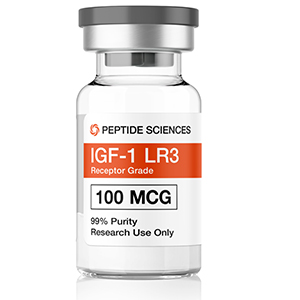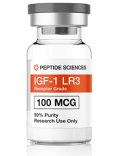IGF-1 LR3 is a hormone that functions as the major mediator of growth hormone (GH)-stimulated somatic growth, as well as a mediator of GH-independent anabolic responses in many cells and tissues. Insulin-like Growth Factor-1 is a small peptide (molecular weight 7647) that circulates in serum bound to high affinity binding proteins. It is an unusual peptide in this regard since it is more than 99 percent protein-bound.
It is synthesized by multiple mesenchymal cell types. As a result, there are two major mechanisms of IGF-1 regulation:
●IGF-1 LR3 that is synthesized in the liver and secreted into the blood is under the control of GH.
●Autocrine/paracrine IGF-1 is synthesized in peripheral tissues, such as bone. Its synthesis is controlled by GH and by factors that are secreted locally by the surrounding cell types. Some of the secreted autocrine/paracrine IGF-1 enters the systemic circulation. Therefore, understanding the regulation of autocrine/paracrine synthesis of this peptide is necessary to interpret changes in serum IGF-1 concentrations.
Insulin-like Growth Factor-1 exerts its effects via activation of the Insulin-like Growth Factor-1 receptor. This receptor is widely distributed, which enables blood-transported IGF-1 to coordinate balanced growth among multiple tissues and organs. In contrast, autocrine/paracrine Insulin-like Growth Factor-1 can stimulate local, unbalanced growth independently of systemic GH. Examples of this type of growth regulation are wound healing and growth of the contralateral kidney after unilateral nephrectomy.
Additional information
| Pack Size | 1 Vial |
|---|---|
| Strength | 100mcg |
| Chemical Composition | Insulin Like Growth Factor |
| Laboratory | Pharmatech |
Dosage Instructions
Injected via Subcutaneous injection after a workout at 20 – 40mcg per day with a typical cycle length of 4-6 weeks
Side Effects
Taking growth hormone can impact how the body responds to insulin which controls blood glucose levels. Untreated growth hormone deficiency can lead to high cholesterol and osteoporosis. Although growth hormone injections are relatively safe and effective, there are a few side effects. Fortunately, serious side effects are rare.Swelling, numbness, and joint and muscle aches and pains are the most common side effects. You may experience these side effects if you’re getting more growth hormone than you need.If you have these symptoms, talk to the physician immediately to adjust the amount of growth hormone you are taking.Some possible side effects with IGF-1/LR3 could be:· Joint pain. Muscle pain. Headaches. Nausea. Hypoglycemia








